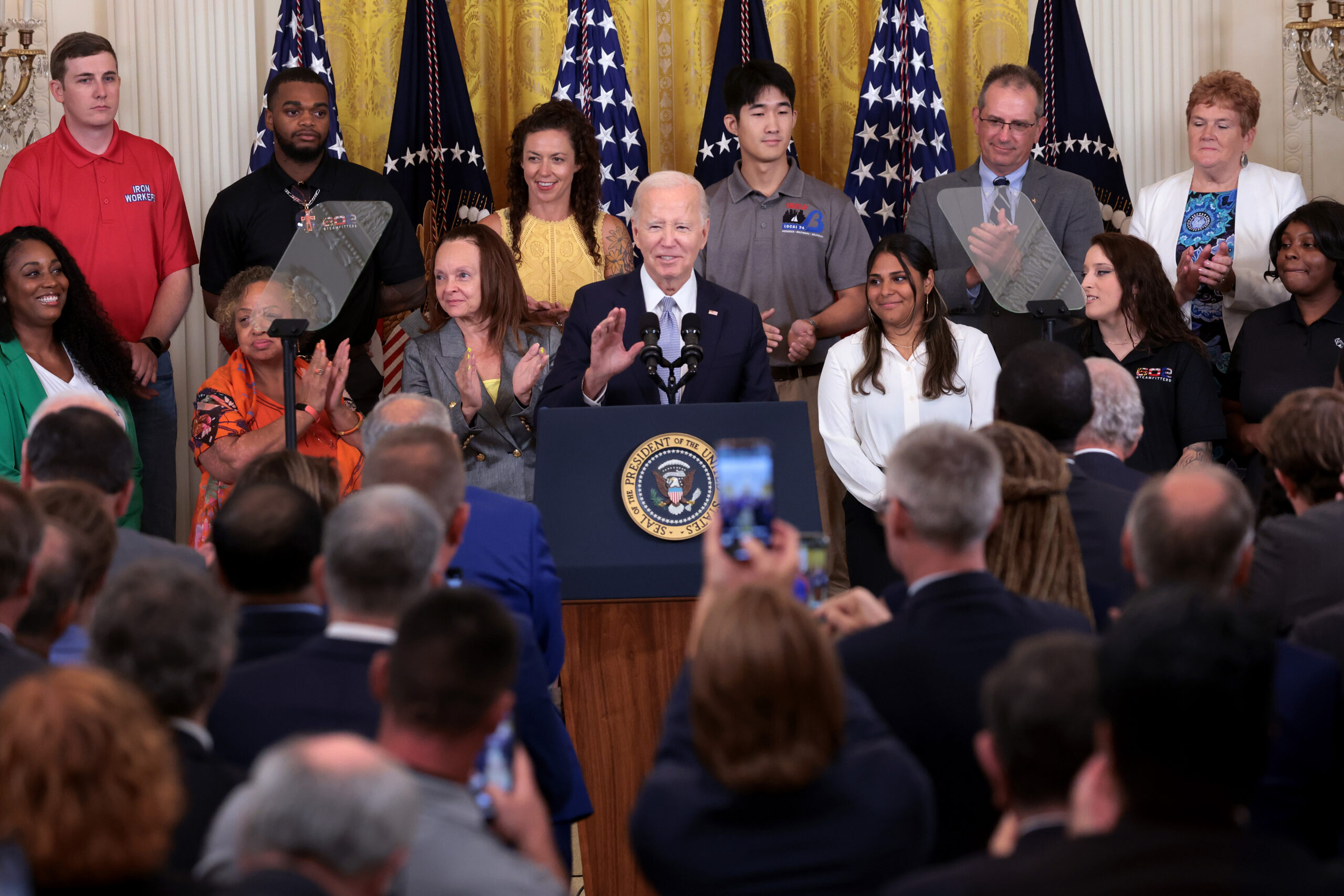Trump’s Win Casts Shadow over US Climate Progress, Global Leadership
Former president Donald Trump’s victory on Tuesday jeopardizes the hard-fought climate progress of the past four years in the United States and sets back the global effort to curb warming at a time when the overwhelming scientific consensus is that delay will rapidly escalate the hazards for the planet.
Voters decided to return to the White House a president who dismisses the threat of climate change in a year that is on track to be the second consecutive hottest on record, just weeks after Hurricanes Helene and Milton wreaked devastation over six states and unprecedented heat gripped the Southwest.
When they’re written, the annals of the 2024 presidential race could focus on any number of factors—the economic dislocation of the working class, attitudes on race and gender, media fragmentation—but any fair record would have to include this note about climate change: It barely was mentioned during the campaign.
Explore the latest news about what’s at stake for the climate during this election season.
Vice President Kamala Harris chose not to emphasize her administration’s achievement in getting the nation’s first comprehensive climate change legislation through a closely divided Congress—a bill for which she cast the tie-breaking vote in 2022. Her campaign labored not to alienate voters in the middle of the political spectrum who have mixed feelings on climate action, or those in the all-important swing state of Pennsylvania, which has become the nation’s No.2 natural gas producing state due to fracking.
In the end, Trump took Pennsylvania, gaining wider margins in all regions—rural, suburban and urban—than he had garnered in 2020. Pre-election polling indicated that fracking was not a big issue for Pennsylvanians. But the economy clearly weighed heavily on voters’ minds. Two-thirds of the electorate in battleground states said the economy was “not so good or poor,” and 69 percent of those voters chose Trump, according to exit polling by a consortium of news organizations.
The exit polls also showed there never was a large group of undecided moderates for either of the candidates to win over. Nearly 80 percent of voters told pollsters they made their decision before September. Among the 4 percent who said they decided “in the last few days,” Trump had an edge (45 percent to 43 percent), with 13 percent voting for a third-party candidate.
Environmental activists pledged that they would fight to preserve the gains that have been made on climate, and would work—not only in Washington, but at the state, local and tribal government levels—to advance policies to protect public health and the planet.
“As our environment and health are put at risk, we will defend our families and communities from threat,” said Manish Bapna, president of the Natural Resources Defense Council, in an emailed statement. “We’ll work with our partners and allies, the philanthropic community and those in the private sector that grasp the economic opportunity and the moral imperative to confront the climate crisis.
“Our purpose will not be shaken,” he added. “Our voice will not go dim.”
Investing in an Energy Transition vs. Solving Economic Woes
In an election where economic concerns loomed large, voters chose the candidate who offered quicker solutions—those that happen to involve increased production and use of fossil fuel.
Harris told voters she planned to continue federal investment in clean energy manufacturing so that “the next generation of breakthroughs, from advanced batteries to electric vehicles,” would be made in the U.S. And in her final speeches on the campaign trail, Harris said she saw the “promise of America” in young people who were determined to tackle climate change. But Harris did not include in her final pitch details on how she would seek to fulfill that particular promise, or go beyond what President Joe Biden’s administration had done on climate.
Aru Shiney-Ajay, executive director of the Sunrise Movement, a youth-led climate action group, said the Democrats failed to convey clearly how a Harris administration would provide the change that voters were clearly looking for. Too many voters, she said, felt they were choosing between two bad options and voted for “the meager change our political system could offer.
“The frank truth is our political system is bought and owned by billionaires and vested interests,” she said. “The Democratic Party cannot win office running as Republicans-Lite. To win, we will need to run on our values and govern on our morals.”
Young voters favored Harris by 13 percentage points (55 percent to 42 percent), according to exit polls, significantly less than the 25-point edge that Biden enjoyed in 2020. Also, young people made up less of the electorate this year, casting 14 percent of all ballots, compared to 17 percent in 2020. It’s too early to know what share of registered young voters went to the polls.
Nathaniel Stinnett, executive director of the nonprofit Environmental Voter Project, said the election results should be a “wake-up call.”
“The climate movement urgently needs more political power because the climate crisis is moving infinitely faster than our politics right now,” he said. His group had identified 4.8 million voters in 19 states who were not likely to vote even though they placed a high priority on climate action; by election day, about 13 percent of them had voted early. “That’s good news—but we clearly need more,” Stinnett said.
“The Democratic Party cannot win office running as Republicans-Lite. To win, we will need to run on our values and govern on our morals.”
— Aru Shiney-Ajay, Sunrise Movement executive director
Liam Donovan, a senior political strategist with the Washington, D.C. lobbying firm Bracewell, which represents a range of energy businesses and interests, said he believed climate became “an uncomfortable topic to touch on for the Democrats” because Trump and Republicans successfully put them on the defensive.
“It was messaged by Republicans as ‘your gas is costing more, your cost of living is above where it had been before,’” Donovan said. “And there was a recognition on the Democratic side of the danger of putting climate front and center. You ended up with this weird, untenable business where Harris is on the stage in Pennsylvania talking about how she’s not going to ban fracking.”
Trump won Michigan after blanketing the swing state with ads warning that Harris would “end all gas-powered cars,” and he recast the Inflation Reduction Act as the cause of inflation during Biden’s presidency. In fact, consumer prices ran up worldwide as economies recovered from the COVID-19 pandemic. And despite inflation in the United States falling to its lowest level since 2021 in the weeks before the election, a faster recovery than other nations, Trump advanced the argument that the United States was in the grip of economic woes that he could solve “easily.”
Trump’s promised solutions would ramp up carbon emissions, and further secure the U.S.’ place as the largest contributor to the cumulative overload of heat-trapping gas in the atmosphere. The few times during the campaign that Trump responded directly to questions about climate change, he suggested that its effects would be slight and far off. He said sea level is expected to rise one inch every 300 or 400 years, and suggested rising seas would create more oceanfront property, contrary to the National Oceanic and Atmospheric Administration’s conclusion that damaging impacts already are evident, with sea levels on track to rise 10 inches in the next 30 years.

Trump has pledged to withdraw or redirect billions of dollars of spending Congress committed to clean energy, putting at risk billions of dollars more of private investment in electric vehicle and battery plants and renewable energy projects. The nonprofit group Environmental Entrepreneurs has tracked 334 new clean energy and vehicles project announcements in 40 states since passage of the Inflation Reduction Act, totaling $125 billion in investment. But Trump disdains wind energy as “too expensive,” and asserts that “it doesn’t work,” in addition to harming birds and whales and causing cancer. Electric vehicles are fine for “a small slice” of the public, but “they don’t go far,” he has said.
As in his first term, when he rolled back more than 100 environmental regulations, Trump has promised to undo rules that the Biden administration put into place to cut carbon pollution from cars, trucks, power plants and oil and gas industry operations. Trump’s deregulatory efforts were slowed and sometimes stymied by the federal courts during his first term, but since then, the Supreme Court has established new precedents that restrain federal regulatory authority. The three appointees Trump named in his first term bolstered the court’s conservative majority.
Trump has voiced a commitment to domestic oil and gas production, which is already at historic levels in the United States. Pumping more of this “liquid gold” into the economy would lower prices, boost manufacturing and jobs and make the nation more secure, Trump has argued. “To keep pace with the world economy that depends on fossil fuels for more than 80 percent of its energy, President Trump will DRILL, BABY, DRILL,” said the Trump campaign’s Agenda 47, the closest thing to an official Republican platform this election. Among the steps his administration could take quickly is to move forward paused natural gas export terminal proposals and rescind steps Biden took to limit drilling in the Arctic.
Unlike in his first term, when Trump hesitated before exiting the Paris climate agreement due to objections from many of his top advisers and cabinet members, he has made clear he would remove the United States from the 2015 treaty it helped to design. “President Trump will once again exit the horrendously unfair Paris Climate Accords,” reads an excerpt from Agenda 47.
Trump’s victory surely will undercut the credibility of the Biden administration’s negotiating team as it heads to this year’s international climate conference in Azerbaijan, which begins on Monday. Climate finance is high on the agenda, and the U.S. has been pushing for contributions from a broader set of countries—including China—for a new fund designed to help developing nations cope with the impacts of climate change.
Considered Cuts to Existing Programs
The budgets of federal environmental, science and public lands agencies would be in the sights of the new efficiency commission Trump has promised to establish in an effort to cut government waste. Trump mega-donor Elon Musk, who is in line to head up the effort, has declared that he could cut “at least $2 trillion” in federal spending, around 30 percent of the budget, even though it will involve “some temporary hardship.” In that role, Musk, the CEO of Tesla Motors, the largest U.S. electric car company, would have a say over agencies and federal programs that directly impact his own business and those of his competitors.
Some analysts believe Trump will not be able to fully undo Biden climate policy, if only because so much of the federal clean energy spending is benefiting GOP-led states and Congressional districts. Only Congress can fully withdraw the investments it voted to make, and there is sentiment for keeping them in place even if the GOP holds onto the House—a result that won’t be known until California’s votes are counted. A number of Republican members of Congress this summer wrote a letter to Speaker of the House Mike Johnson opposing “prematurely repealing energy tax credits, particularly those which were used to justify investments that already broke ground.”
“Trump’s highest performing states benefit the most from the massive investments and millions of jobs from the Inflation Reduction Act, so he’d be a fool to reverse course.”
— Kaniela Ing, Green New Deal Network national director
Advocates for a clean energy transition expressed determination. “No matter what Trump may say, the shift to clean energy is unstoppable and our country is not turning back,” said Gina McCarthy, who served as White House National Climate Advisor under Biden, in an emailed statement. “Our coalition is bigger, more bipartisan, better organized, and fully prepared to deliver climate solutions, boost local economies, and drive climate ambition. We cannot and will not let Trump stand in the way of giving our kids and grandkids the freedom to grow up in safer and healthier communities.”
Kaniela Ing, national director of the Green New Deal Network, called the election “a heavy loss,” but said that Trump can’t change the fact the majority of Americans prefer affordable clean energy over fossil fuels.
“Solar and wind are already cheaper than oil and generate more power than coal,” Ing said. “Trump’s highest performing states benefit the most from the massive investments and millions of jobs from the Inflation Reduction Act, so he’d be a fool to reverse course.”
Trump’s second term sets the stage for conflict between those regions of the country that wish to maintain federal support for their new clean energy projects and the forces that wish to eliminate the effort, either for ideological reasons, like the former advisers who authored the conservative policy roadmap Project 2025, or for commercial reasons, like the oil and gas executives who helped support his campaign.
The oil and gas magnates who gathered at Trump’s Mar-a-Lago compound last spring never brought in the $1 billion that the former president asked them to raise for his re-election effort. But the industry did pour more money into the 2024 election than to any other U.S. election on record: $208.5 million, with 88 percent of it going to Republicans, led by Trump, according to the watchdog group Open Secrets.
The president-elect has laid out an agenda that would remove for at least the next four years one of the greatest threats to business as usual for those donors: a federal government that is determined to act on climate change, and to lead other nations to follow suit.
About This Story
Perhaps you noticed: This story, like all the news we publish, is free to read. That’s because Inside Climate News is a 501c3 nonprofit organization. We do not charge a subscription fee, lock our news behind a paywall, or clutter our website with ads. We make our news on climate and the environment freely available to you and anyone who wants it.
That’s not all. We also share our news for free with scores of other media organizations around the country. Many of them can’t afford to do environmental journalism of their own. We’ve built bureaus from coast to coast to report local stories, collaborate with local newsrooms and co-publish articles so that this vital work is shared as widely as possible.
Two of us launched ICN in 2007. Six years later we earned a Pulitzer Prize for National Reporting, and now we run the oldest and largest dedicated climate newsroom in the nation. We tell the story in all its complexity. We hold polluters accountable. We expose environmental injustice. We debunk misinformation. We scrutinize solutions and inspire action.
Donations from readers like you fund every aspect of what we do. If you don’t already, will you support our ongoing work, our reporting on the biggest crisis facing our planet, and help us reach even more readers in more places?
Please take a moment to make a tax-deductible donation. Every one of them makes a difference.
Thank you,
David Sassoon
Founder and Publisher
Vernon Loeb
Executive Editor
Share this article
- Republish
Disclaimer: The copyright of this article belongs to the original author. Reposting this article is solely for the purpose of information dissemination and does not constitute any investment advice. If there is any infringement, please contact us immediately. We will make corrections or deletions as necessary. Thank you.
Title:Trump’s Win Casts Shadow over US Climate Progress, Global Leadership
Url:https://www.investsfocus.com










